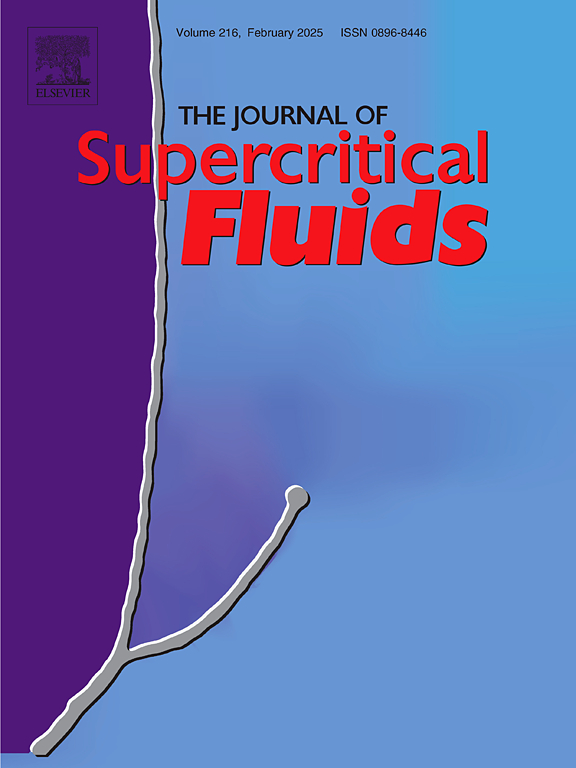胡椒碱和黑胡椒提取物的超临界二氧化碳浸渍对聚(l-乳酸)薄膜性能的影响
IF 3.4
3区 工程技术
Q2 CHEMISTRY, PHYSICAL
引用次数: 0
摘要
研究了使用超临界二氧化碳将胡椒碱和黑胡椒提取物浸渍到聚(L-乳酸)(PLLA)薄膜中。以胡椒碱为模型,确定了压力(10 和 12 兆帕)和温度(40 和 50 °C)等操作条件对浸渍产量的影响。在 10 兆帕和 50 摄氏度的条件下,胡椒碱和黑胡椒提取物的浸渍效果最佳,并被用于将胡椒碱和黑胡椒提取物掺入 200 微米的薄膜中。在黑胡椒提取物和胡椒碱的浸渍过程中,测试了添加 5%和 10%乙醇作为共溶剂的效果。对浸渍薄膜的热性能、机械性能、结构性能和表面性能进行了表征。添加 5% 的助溶剂有利于提高胡椒碱的产量(5.6%)。使用助溶剂浸渍胡椒碱和提取物可提高薄膜的结晶度,并显著改变机械性能。超临界技术为在聚乳酸薄膜中浸渍活性剂带来了希望,有望在食品包装应用中得到发展。本文章由计算机程序翻译,如有差异,请以英文原文为准。
Effect of supercritical CO2 impregnation of piperine and black pepper extract on properties of poly(l-lactic acid) films
The impregnation of piperine and black pepper extract into poly (L-lactic acid) (PLLA) films using supercritical CO2 was investigated. Piperine was a model to determine the influence of operating conditions of pressure (10 and 12 MPa) and temperature (40 and 50 °C) on the impregnation yield. The most favorable conditions were obtained at 10 MPa and 50 °C and were used in the incorporation of piperine and black pepper extract into 200 µm films. The addition of 5 and 10 % ethanol as cosolvent was tested during the impregnation processes of black pepper extract and piperine. The impregnated films were characterized on their thermal, mechanical, structural and surface properties. The addition of 5 % cosolvent favored the increase in piperine yield (5.6 %). The impregnation of piperine and extract using co-solvent led to an increase in the crystallinity of the films and significant changes in the mechanical properties. Supercritical technology has shown promise for the impregnation of active agents into PLLA films for potential development in food packaging applications.
求助全文
通过发布文献求助,成功后即可免费获取论文全文。
去求助
来源期刊

Journal of Supercritical Fluids
工程技术-工程:化工
CiteScore
7.60
自引率
10.30%
发文量
236
审稿时长
56 days
期刊介绍:
The Journal of Supercritical Fluids is an international journal devoted to the fundamental and applied aspects of supercritical fluids and processes. Its aim is to provide a focused platform for academic and industrial researchers to report their findings and to have ready access to the advances in this rapidly growing field. Its coverage is multidisciplinary and includes both basic and applied topics.
Thermodynamics and phase equilibria, reaction kinetics and rate processes, thermal and transport properties, and all topics related to processing such as separations (extraction, fractionation, purification, chromatography) nucleation and impregnation are within the scope. Accounts of specific engineering applications such as those encountered in food, fuel, natural products, minerals, pharmaceuticals and polymer industries are included. Topics related to high pressure equipment design, analytical techniques, sensors, and process control methodologies are also within the scope of the journal.
 求助内容:
求助内容: 应助结果提醒方式:
应助结果提醒方式:


